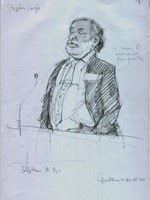By Dr Suzanne Beech (@suzanneebeech)
Hi everyone! I am Suzanne and I joined GEES in October last year. Being a geographer is very much in my
Hi everyone! I am Suzanne and I joined GEES in October last year. Being a geographer is very much in my
 |
| Walking the South Downs Way in the Snow (April 2013) |
 |
| The Lanyon Building at QUB - a typical 'QUB Postcard' Image |
I went to QUB
straight after school – admittedly I was not sure about this at first. Queen’s
had been my second choice, I did not think I would actually end up going there,
but my Biology A-Level did not go quite as well as perhaps it should have done.
Consequently I went determined not to enjoy myself. This is something I really laugh about now given that I ended up spending over eight really happy years
there. Back then doing a PhD was not really something that was on my radar (I
was convinced that I was supposed to be a primary school teacher for quite a
long time). Research did seem, though, like something that would be a really
rewarding thing to do, and I really looked up to all of the PhD students who
often helped with teaching in the School of Geography, Archaeology and
Palaeoecology (GAP), but they all seemed so intelligent and clever and all a
little bit out of my league. You could perhaps say that research is something
that has always been at the back of my mind, but was definitely not something
that was set in stone.
My attitude
changed completely during the third year of my undergraduate study. I was
enrolled on a four year degree programme that included a year spent overseas in
Spain on the Erasmus scheme and in September 2007 I moved to Madrid where I
studied at the Universidad Autónoma de Madrid (UAM). This was a bit of a shock
to the system in a number of ways: first, I had never actually lived away from
home before; second, at the time the population of Madrid was about twice that
of Northern Ireland and I felt a little overwhelmed by the sheer number of
people; third, my Spanish was nowhere near as good as I thought it was when I
left home and therefore studying Geography in Spain in Spanish was a bit of a
challenge for the first three months or so. I recall going on a fieldtrip to
Extremadura in the West of Spain on the Portuguese border shortly after I had
arrived where I spent a weekend in blissful ignorance, with no idea where
exactly we were, what we were doing, or what the point of the whole expedition
was. I came to realise that fieldtrips were a common feature of the Spanish
higher education system, in Geography at least, and every few weeks it seemed
we were off doing something in the field whether for a day or a weekend.
 |
| Selected Fieldtrips in Spain Clockwise from top left: The Extremadura landscape, a lighthouse in Galicia, the Old Town in Toledo, the castle at Segovia |
 |
| Prof Steve Royle - a good likeness |
I began my
PhD in September 2009, just after I had finished my BSc and spent the next
three and a bit years researching and writing up my findings into the
motivations and influences for international student mobility to the UK, under
the supervision of Prof Steve Royle. It was the most fantastic experience and I
loved spending my time with lots of international students, from all manner of
backgrounds and nationalities and hearing their stories of how they found
themselves to be studying in the UK. Learning about their decision making and
how geography and place were critical to this process was an exciting time –
albeit one that was filled with blood, sweat and tears. People are always
putting pictures of their babies on social media – I posted a picture of my
thesis, it is my baby.
 |
| Students waving field notebooks at me in Amberley Working Museum, West Sussex |
Doing a PhD
is a really unusual time. I loved it, but it drove me a little mad sometimes as
well. I also knew that deciding to stay in academia would not necessarily be an
easy option. However, I had really enjoyed the research and all the things that
go with it (like conferences and meeting proper famous geographers), and I had
loved all of the teaching opportunities as well, particularly teaching in the
field. I applied for several jobs and worked in Queen’s for a few months on the
School of GAP’s Athena Swan bid (an initiative which recognises moves towards
greater gender equality in academia). I was also offered a post in the Northern
Ireland Civil Service, which I turned down because I had a feeling that
something better was just around the corner – some people thought I was a
little crazy given that I had been trying hard to get a job. This included my
friend and office-mate Catherine who tried to convince me otherwise but to no
avail. I was certain that something else was coming, and literally a few weeks
later I was offered my job in GEES. The last eight months have been amazing and
I have no regrets whatsoever (although I do get homesick sometimes). Things
have been a real whirlwind, I have taught my own research-led module on
transnationalism and have had my first paper published in Area. I cannot wait
to see what the next year at Hull has to offer me, and I am really excited to
see what happens thereafter!